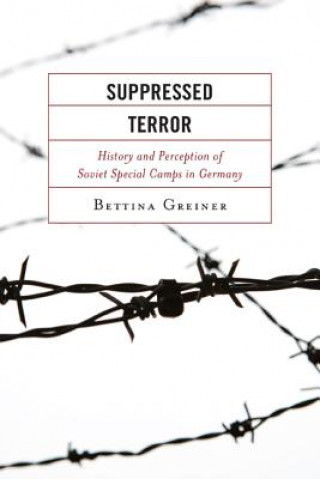
Kód: 04669570
Suppressed Terror
Autor Bettina Greiner
At the end of World War II, the Soviet secret police installed ten special camps in the Soviet occupation zone, later to become the German Democratic Republik. Between 1945 and 1950, roughly 154,000 Germans were held incommunicado ... celý popis
- Jazyk:
 Angličtina
Angličtina - Väzba: Pevná
- Počet strán: 418
Nakladateľ: Lexington Books, 2014
- Viac informácií o knihe

Mohlo by sa vám tiež páčiť
-

Japanese Chronicles
35.59 € -2 % -

Wisden Collector's Guide
68.53 € -

Why Mum?
12.37 € -

Alicyclic Chemistry
538.42 € -

Rural Gender Relations
229.56 € -

Crisis Communications
188.03 € -

AI and Cognitive Science '89
70.78 €
Darujte túto knihu ešte dnes
- Objednajte knihu a vyberte Zaslať ako darček.
- Obratom obdržíte darovací poukaz na knihu, ktorý môžete ihneď odovzdať obdarovanému.
- Knihu zašleme na adresu obdarovaného, o nič sa nestaráte.
Viac informácií o knihe Suppressed Terror
Nákupom získate 526 bodov
 Anotácia knihy
Anotácia knihy
At the end of World War II, the Soviet secret police installed ten special camps in the Soviet occupation zone, later to become the German Democratic Republik. Between 1945 and 1950, roughly 154,000 Germans were held incommunicado in these camps. Whether those accused of being Nazis, spies, or terrorists were indeed guilty as charged, they were indiscriminately imprisoned as security threats and denied due process of the law. One third of the captives did not survive. To this day, most Germans have no knowledge of this postwar Stalinist persecution, even though it exemplifies in a unique way the entangled history of Germans as perpetrators and victims. How can one write the history of victims in a "society of perpetrators?" This is only one of the questions Displaced Terror: History and Perception of Soviet Special Camps in Germany raises in exploring issues in memory culture in contemporary Germany. The study begins with a detailed description of the camp system against the backdrop of Stalinist security policies in a territory undergoing a transition from war zone to occupation zone to Cold War hot spot. The interpretation of the camps as an instrument of pacification rather than of denacification does not ignore the fact that, while actual perpetrators were a minority, the majority of the special camp inmates had at least been supporters of Nazi rule and were now imprisoned under life-threatening conditions together with victims and opponents of the defeated regime. Based on their detention memoirs, the second part of the book offers a closer look at life and death in the camps, focusing on the prisoners' self-organization and the frictions within these coerced communities. The memoirs also play an important role in the third and last part of the study. Read as attempts to establish public acknowledgment of violence suffered by Germans, they mirror German memory culture since the end of World War II.
 Parametre knihy
Parametre knihy
Zaradenie knihy Knihy po anglicky Humanities History Regional & national history
212.68 €
- Celý názov: Suppressed Terror
- Autor: Bettina Greiner
- Jazyk:
 Angličtina
Angličtina - Väzba: Pevná
- Počet strán: 418
- EAN: 9780739177433
- ISBN: 0739177435
- ID: 04669570
- Nakladateľ: Lexington Books
- Hmotnosť: 758 g
- Rozmery: 162 × 237 × 40 mm
- Dátum vydania: 01. May 2014
Obľúbené z iného súdka
-

Hundred Years' War on Palestine
12.06 € -24 % -

Ethnic Cleansing of Palestine
14.41 € -23 % -

History of Japan
16.36 € -19 % -

Ten Myths About Israel
13.60 € -14 % -

Strange Death of Europe
16.56 € -23 % -

Decline and Fall of the Roman Empire
5.92 € -21 % -

Secret History
12.27 € -23 % -

God's Playground A History of Poland
68.74 € -

Mayflower
15.74 € -23 % -

How to be a Victorian
14.41 € -23 % -

Plantagenets
13.19 € -29 % -

General's Son
20.25 € -4 % -

Iran: A Very Short Introduction
8.99 € -31 % -

Temples of Karnak
153.55 € -

Cuneiform
11.14 € -23 % -

Twenty Years A-Growing
10.12 € -23 % -

History of Witchcraft in England from 1558 to 1718
19.02 € -

China in Africa
37.43 € -

Bohemian Paris
16.56 € -18 % -

Islandman
10.53 € -20 % -

Alexiad
17.79 € -20 % -

Lancaster And York
22.91 € -

Inside Hitler's Greece
20.96 € -20 % -

Modern France: A Very Short Introduction
9.40 € -34 % -

Diana: Her True Story - In Her Own Words
11.04 € -23 % -

The Fourth Turning
20.66 € -1 % -

The Oxford History of Ancient Egypt
15.54 € -23 % -

Churchill: The Power of Words
15.13 € -22 % -

Palestine
20.25 € -20 % -

Korean History in Maps
28.02 € -10 % -

Great Gatsby (Wisehouse Classics Edition)
16.15 € -37 % -

Viking Way
46.23 € -7 % -

The Thirteenth Tribe
12.57 € -

My Promised Land
20.86 € -23 % -

Vanished Kingdoms
18.81 € -22 % -

Age Of Revolution
16.56 € -23 % -

Life and Death of Anne Boleyn
23.01 € -

Coming of the Third Reich
18.71 € -23 % -

Children of Ash and Elm
16.97 € -22 % -

Europe Between the Oceans
34.16 € -7 % -

Socialism Betrayed
19.63 € -18 % -

303 Squadron
21.17 € -13 % -

Ancient Celts, Second Edition
26.90 € -18 % -

Dancing in the Glory of Monsters
15.74 € -23 % -

Battle of Britain: Luftwaffe Blitz (Images of War)
25.87 € -1 % -

Age of Confucian Rule
26.59 € -14 % -

Beyond Band of Brothers
16.56 € -23 % -

Benjamin Franklin
18.71 € -13 % -

On China
17.18 € -21 %
Osobný odber Bratislava a 2642 dalších
Copyright ©2008-24 najlacnejsie-knihy.sk Všetky práva vyhradenéSúkromieCookies



 21 miliónov titulov
21 miliónov titulov Vrátenie do mesiaca
Vrátenie do mesiaca 02/210 210 99 (8-15.30h)
02/210 210 99 (8-15.30h)